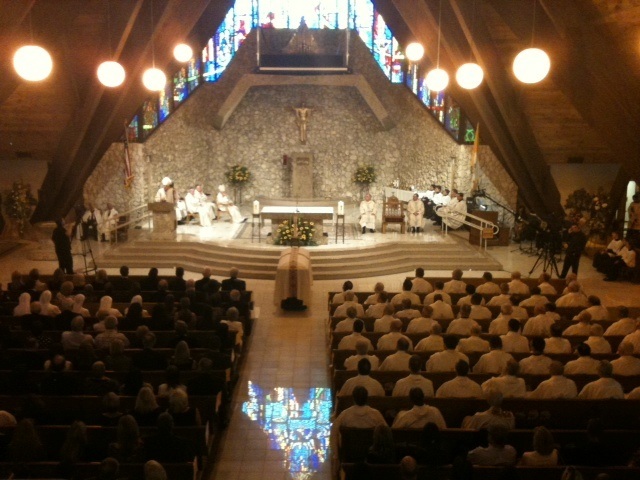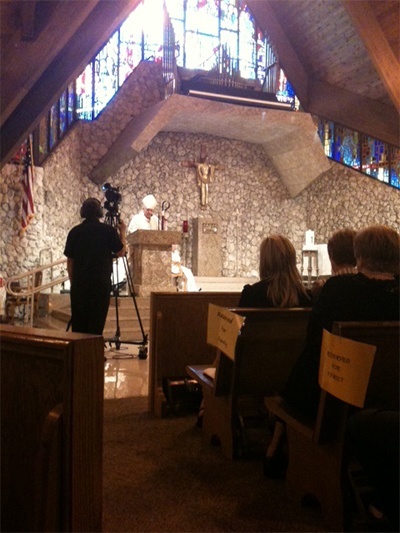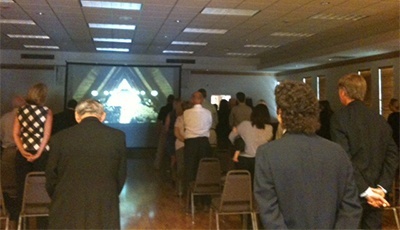By Archbishop Thomas Wenski - The Archdiocese of Miami

Photographer: JUAN DI PRADO | For the Florida Catholic
A view of the funeral Mass for Father Gabriel O'Reilly, attended by dozens of archdiocesan priests and more than 1,000 current and former parishioners.
Archbishop Thomas Wenski preached this homily at the funeral Mass for Father Gabriel O'Reilly, pastor of St. David Parish in Davie. Father O'Reilly died June 7, 2013 at the age of 69. The Mass was celebrated June 15, 2013 before an overflow congregation of more than 1,000 at the parish he founded and led for 39 years. The Mass also was streamed live over the Web for the benefit of Father O'Reilly's family in Ireland and hundreds of former parishioners now living in other parts of the U.S.
The Gospel reading that we have just heard, the account of the two disciples� encounter with the risen Lord along the way to Emmaus, reminds us that Christianity �was not born from a myth or an idea, but with an encounter: from meeting Jesus of Nazareth, the risen Christ.� (Pope Benedict XVI)
As they recognized him in the �breaking of the bread� their sorrow was turned into joy. Today, we gather to celebrate the Mass of Christian burial for Father Gabriel O�Reilly, and in this Eucharist we too encounter the living Jesus. And we seek this encounter because it is this encounter that gives direction to our living and meaning in our dying. The Eucharist is our pledge of future glory � having encountered him hidden in the sacramental signs of his Body and Blood, that is, in �the breaking of the bread,� we hope to know him in glory when we shall see him face to face.
It is in this hope that I, on behalf of all the priests and people of this archdiocese, wish to express to Father O�Reilly�s blood family � to his brothers, his sisters-in law, his nephews and nieces � our deepest condolences. All of us here also feel your loss, and with you we grieve. To the priests whom you see gathered here this morning, he was a brother and to these people who made up Father Gabe�s parish family, he was a father, a friend and a servant leader. Dear parishioners of St. David Parish, you too are bereaved as you say �goodbye� to your parish priest who for over 40 years shepherded you in this community of faith, hope and love. May the Lord comfort you in your loss as well.
 Someone once said that tears are prayers incarnate: Your tears will not go unheard by our merciful Father and one day, as we say in the Mass prayer, �God himself will dry our tears� and on that day, we hope to once again enjoy the company of Father O�Reilly and all the faithful departed when together we will see God as he is.
Someone once said that tears are prayers incarnate: Your tears will not go unheard by our merciful Father and one day, as we say in the Mass prayer, �God himself will dry our tears� and on that day, we hope to once again enjoy the company of Father O�Reilly and all the faithful departed when together we will see God as he is.
Father Gabe O�Reilly was a priest for 46 years. He, together with not a few of the priests present here today, came from Ireland as a missionary. The Archdiocese of Miami, and the Church in the entire state of Florida, is indebted to Ireland and her Catholic families who over the years generously sent their sons to labor in this portion of the Lord�s vineyard. Like Father O�Reilly, every priest here is privileged to serve God and his people in this awesome vocation of the holy priesthood. And even though we carry this treasure in the �earthen vessels� of our frail humanity and sinfulness, it is a holy priesthood because as �other Christs� we share in our Lord�s own high priesthood in our ministry of Word and Sacrament. God uses imperfect instruments to work his will so that we will know that it is He who saves, not we. The mercy of God will always be greater than yours or our own weakness and unworthiness.
This past April, Pope Francis celebrated his first Chrism Mass with the priests of Rome. At that time, he said, �A good priest can be recognized by the way his people are anointed: This is a clear proof. When our people are anointed with the oil of gladness, it is obvious: for example, when they leave Mass looking as if they have heard good news. Our people like to hear the Gospel preached with �unction,�they like it when the Gospel we preach touches their daily lives, when it runs down like the oil of Aaron to the edges of reality, when it brings light to moments of extreme darkness, to the �outskirts� where people of faith are most exposed to the onslaught of those who want to tear down their faith.�
�People thank us,� Pope Francis continued, �because they feel that we have prayed over the realities of their everyday lives, their troubles, their joys, their burdens and their hopes. And when they feel that the fragrance of the Anointed One, of Christ, has come to them through us, they feel encouraged to entrust to us everything they want to bring before the Lord: �Pray for me, Father, because I have this problem�; �Bless me Father�; �Pray for me�. These words are the sign that the anointing has flowed down to the edges of the robe, for it has turned into a prayer of supplication, the supplication of the People of God. When we have this relationship with God and with his people, and grace passes through us, then we are priests, mediators between God and men.�
Each one of us priests would want to be remembered the way that those parishioners whom I met outside his hospital room last Thursday told me they remembered Father O�Reilly. �What a great man!� What a gentle soul and compassionate priest!� The many comments on the archdiocesan website also testify to the impact of this giant of a man: whether in his homilies or in the confessional, whether in his visits to the sick and the homebound or in his friendly banter with parishioners during the parish carnivals, he touched over the years the lives of thousands of people and strengthened them in their faith. As Pope Francis said, �A good priest can be recognized by the way his people are anointed.�
 Because there is this special bond that unites us, priests, to Father Gabriel O�Reilly, a priestly bond of solidarity and communion, we concelebrate together this Holy Sacrifice of the Mass for the repose of his soul. This special bond is �stronger than death� � for we were ordained like Melchisedek of old, priests forever. And since we priests know our own human frailty, we are not shy in asking for prayers for him � and when we die, we beg your prayers for us, confident that the love of Jesus Christ who gave us the gift of the priesthood is stronger than death. Our priestly lives and ministries � like that of Father O�Reilly - are forever linked to the sacred history of salvation lived out in this local Church of Miami, and for this reason each parish in the diocese will remember Father in further Masses offered for the repose of his soul.
Because there is this special bond that unites us, priests, to Father Gabriel O�Reilly, a priestly bond of solidarity and communion, we concelebrate together this Holy Sacrifice of the Mass for the repose of his soul. This special bond is �stronger than death� � for we were ordained like Melchisedek of old, priests forever. And since we priests know our own human frailty, we are not shy in asking for prayers for him � and when we die, we beg your prayers for us, confident that the love of Jesus Christ who gave us the gift of the priesthood is stronger than death. Our priestly lives and ministries � like that of Father O�Reilly - are forever linked to the sacred history of salvation lived out in this local Church of Miami, and for this reason each parish in the diocese will remember Father in further Masses offered for the repose of his soul.
The Paschal Candle stands besides the coffin at every Mass of Christian burial � just as it stands by the font at baptisms. Five grains of incense represent the five wounds of Christ. Those five grains in the form of a cross are framed by the Greek letters, Alpha and Omega, symbolizing Christ � our beginning and our end. When the candle is lit after the blessing of the new fire, the priests prays � as Father Gabe prayed the many times he celebrated the Easter Vigil: �May the light of Christ, rising in glory, dispel the darkness of our hearts and minds.� The words of St. Paul continue to comfort us: �If we have died with Christ, we believe that we are at the same time living with him.�
The Liturgy of the Hours � which we priests are obliged to pray daily - suggests a reading from St. Braulio, bishop of Saragossa, for the Office for the Dead. Faith assures us, St. Braulio tells us, that just as Christ is not dead, we too shall not die. �The hope of resurrection encourages us because we shall see again those whom we lose here below.� He reminds us that as baptized Catholics � and most certainly as ordained priests � �we do not belong to ourselves; we belong to the one who redeemed us. Our will should always depend on his. For this reason we say in the Lord�s prayer: �Thy will be done�. Confronted with death, the sentiments of Job should be our own: �The Lord gave and the Lord took away. Blessed be the name of the Lord!�� (St. Braulio, Office of the Dead)
As they recognized him in the �breaking of the bread� their sorrow was turned into joy. Today, we gather to celebrate the Mass of Christian burial for Father Gabriel O�Reilly, and in this Eucharist we too encounter the living Jesus. And we seek this encounter because it is this encounter that gives direction to our living and meaning in our dying. The Eucharist is our pledge of future glory � having encountered him hidden in the sacramental signs of his Body and Blood, that is, in �the breaking of the bread,� we hope to know him in glory when we shall see him face to face.
It is in this hope that I, on behalf of all the priests and people of this archdiocese, wish to express to Father O�Reilly�s blood family � to his brothers, his sisters-in law, his nephews and nieces � our deepest condolences. All of us here also feel your loss, and with you we grieve. To the priests whom you see gathered here this morning, he was a brother and to these people who made up Father Gabe�s parish family, he was a father, a friend and a servant leader. Dear parishioners of St. David Parish, you too are bereaved as you say �goodbye� to your parish priest who for over 40 years shepherded you in this community of faith, hope and love. May the Lord comfort you in your loss as well.

Photographer: JUAN DI PRADO | For the Florida Catholic
Archbishop Thomas Wenski preaches the homily as cameras stream the event live through the Web.
Father Gabe O�Reilly was a priest for 46 years. He, together with not a few of the priests present here today, came from Ireland as a missionary. The Archdiocese of Miami, and the Church in the entire state of Florida, is indebted to Ireland and her Catholic families who over the years generously sent their sons to labor in this portion of the Lord�s vineyard. Like Father O�Reilly, every priest here is privileged to serve God and his people in this awesome vocation of the holy priesthood. And even though we carry this treasure in the �earthen vessels� of our frail humanity and sinfulness, it is a holy priesthood because as �other Christs� we share in our Lord�s own high priesthood in our ministry of Word and Sacrament. God uses imperfect instruments to work his will so that we will know that it is He who saves, not we. The mercy of God will always be greater than yours or our own weakness and unworthiness.
This past April, Pope Francis celebrated his first Chrism Mass with the priests of Rome. At that time, he said, �A good priest can be recognized by the way his people are anointed: This is a clear proof. When our people are anointed with the oil of gladness, it is obvious: for example, when they leave Mass looking as if they have heard good news. Our people like to hear the Gospel preached with �unction,�they like it when the Gospel we preach touches their daily lives, when it runs down like the oil of Aaron to the edges of reality, when it brings light to moments of extreme darkness, to the �outskirts� where people of faith are most exposed to the onslaught of those who want to tear down their faith.�
�People thank us,� Pope Francis continued, �because they feel that we have prayed over the realities of their everyday lives, their troubles, their joys, their burdens and their hopes. And when they feel that the fragrance of the Anointed One, of Christ, has come to them through us, they feel encouraged to entrust to us everything they want to bring before the Lord: �Pray for me, Father, because I have this problem�; �Bless me Father�; �Pray for me�. These words are the sign that the anointing has flowed down to the edges of the robe, for it has turned into a prayer of supplication, the supplication of the People of God. When we have this relationship with God and with his people, and grace passes through us, then we are priests, mediators between God and men.�
Each one of us priests would want to be remembered the way that those parishioners whom I met outside his hospital room last Thursday told me they remembered Father O�Reilly. �What a great man!� What a gentle soul and compassionate priest!� The many comments on the archdiocesan website also testify to the impact of this giant of a man: whether in his homilies or in the confessional, whether in his visits to the sick and the homebound or in his friendly banter with parishioners during the parish carnivals, he touched over the years the lives of thousands of people and strengthened them in their faith. As Pope Francis said, �A good priest can be recognized by the way his people are anointed.�

Photographer: JUAN DI PRADO | For the Florida Catholic
Crowd in the overflow room follows the Mass on a giant TV screen.
The Paschal Candle stands besides the coffin at every Mass of Christian burial � just as it stands by the font at baptisms. Five grains of incense represent the five wounds of Christ. Those five grains in the form of a cross are framed by the Greek letters, Alpha and Omega, symbolizing Christ � our beginning and our end. When the candle is lit after the blessing of the new fire, the priests prays � as Father Gabe prayed the many times he celebrated the Easter Vigil: �May the light of Christ, rising in glory, dispel the darkness of our hearts and minds.� The words of St. Paul continue to comfort us: �If we have died with Christ, we believe that we are at the same time living with him.�
The Liturgy of the Hours � which we priests are obliged to pray daily - suggests a reading from St. Braulio, bishop of Saragossa, for the Office for the Dead. Faith assures us, St. Braulio tells us, that just as Christ is not dead, we too shall not die. �The hope of resurrection encourages us because we shall see again those whom we lose here below.� He reminds us that as baptized Catholics � and most certainly as ordained priests � �we do not belong to ourselves; we belong to the one who redeemed us. Our will should always depend on his. For this reason we say in the Lord�s prayer: �Thy will be done�. Confronted with death, the sentiments of Job should be our own: �The Lord gave and the Lord took away. Blessed be the name of the Lord!�� (St. Braulio, Office of the Dead)


Comments from readers